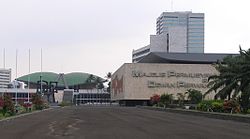| Indonesia |
 This article is part of the series: |
| |
| Other countries · Atlas Politics portal |
The politics of Indonesia takes place in a framework of a presidential representative democratic republic, whereby the President of Indonesia is both head of state and head of government, and of a multi-party system. Executive power is exercised by the government. Legislative power is vested in both the government and the two People's Representative Councils. The Judiciary is independent of the executive and the legislature. The 1945 constitution provided for a limited separation of executive, legislative, and judicial power. The governmental system has been described as "presidential with parliamentary characteristics." Following the Indonesian 1998 Revolution and the resignation of President Suharto, several political reforms were set in motion.
Contents[hide] |
Reform process
A constitutional reform process has been underway since 1999, and has already produced several important changes.
Among these are term limits of up to two five-year terms for the President and Vice President, and measures to institute checks and balances. The highest state institution is the People's Consultative Assembly (MPR), whose functions included electing the president and vice president (since 2004 the president is elected directly by the people), establishing broad guidelines of state policy, and amending the constitution. The 695-member MPR includes all 550 members of the People's Representative Council (DPR) (the House of Representatives) plus 130 "regional representatives" elected by the twenty-six provincial parliaments and sixty-five appointed members from societal groups.
The DPR, which is the premier legislative institution, originally included 462 members elected through a mixed proportional/district representational system and thirty-eight appointed members of the armed forces (TNI) and police (POLRI). TNI/POLRI representation in the DPR was ended before the general election in 2004 and will end in the MPR in 2009. Societal group representation in the MPR was eliminated in 2004 through further constitutional change. Military domination of regional administration is gradually breaking down, with new regulations prohibiting active-duty officers from holding political office.
Having served as rubberstamp bodies in the past, the DPR and MPR have gained considerable power and are increasingly assertive in oversight of the executive branch. Under constitutional changes in 2004, the MPR became a bicameral legislature, with the creation of the Dewan Perwakilan Daerah (DPD), in which each province is represented by four members, although its legislative powers are more limited than those of the DPR. Through his appointed cabinet, the president retains the authority to conduct the administration of the government.
A general election in June 1999 produced the first freely elected national, provincial, and regional parliaments in over forty years. In October 1999 the MPR elected a compromise candidate, Abdurrahman Wahid, as the country's fourth president, and Megawati Sukarnoputri — a daughter of Sukarno, the country's first president — as the vice president. Megawati's PDI-P party had won the largest share of the vote (34%) in the general election, while Golkar, the dominant party during the Soeharto era, came in second (22%). Several other, mostly Islamic parties won shares large enough to be seated in the DPR.
Executive branch
| Office | Name | Party | Since |
|---|---|---|---|
| President | Susilo Bambang Yudhoyono | PD | 20 October 2004 |
| Vice-president | Jusuf Kalla | Golkar | 20 October 2004 |
The president and vice president are selected by vote of the citizens for five-year terms. Prior to 2004, they were chosen by People's Consultative Assembly. The last election was held 20 September 2004. The president heads the United Indonesia Cabinet (Kabinet Indonesia Bersatu) The President of Indonesia is directly-elected for five-year terms, and is the head of state, commander-in-chief of Indonesian armed forces and responsible for domestic governance and policy-making and foreign affairs. The president appoints a cabinet, who don't have to be elected members of the legislature.
Legislative branch
The People's Representative Council (Dewan Perwakilan Rakyat) has 550 members, elected for a five year term by proportional representation in multi-member constituencies. The other chamber of the People's Consultative Assembly(Majelis Permusyawaratan Rakyat) is the Regional Representatives Council (Dewan Perwakilan Daerah). Following elections in 2004, the MPR became a bicameral parliament, with the creation of the DPD as its second chamber in an effort to increase regional representation.
Political parties and elections
The General Election Committee (KPU - Komisi Pemilihan Umum) is the body responsible for running both parliamentary and presidential elections in Indonesia. Prior to the General Election of 2004, the KPU was made up of members who were also members of political parties, however members of the KPU must now be non-partisan.
| Candidates for President | Supporting Parties | Parties | First round | Second round | ||
|---|---|---|---|---|---|---|
| Votes | % | Votes | % | |||
| Susilo Bambang Yudhoyono | Democratic Party | 36,051,236 | 33.58 | 67,196,112 | 60.9 | |
| Megawati Sukarnoputri | Indonesian Democratic Party-Struggle | 28,171,063 | 26.24 | 43,198,851 | 39.1 | |
| Wiranto | Golkar | 23,811,028 | 22.18 | |||
| Amien Rais | National Mandate Party | 16,035,565 | 14.94 | |||
| Hamzah Haz | United Development Party | 3,275,011 | 3.06 | |||
| Total | 106,228,247 | 100.0 | 110,394,163 | 100.0 | ||
| Source: KPU | ||||||
| Parties | Votes | % | Seats |
|---|---|---|---|
| Golkar (Partai Golkar) | 24,480,757 | 21.6 | 128 |
| Indonesian Democratic Party-Struggle (Partai Demokrasi Indonesia Perjuangan) | 21,025,991 | 18.5 | 109 |
| National Awakening Party (Partai Kebangkitan Bangsa) | 11,994,877 | 10.6 | 52 |
| United Development Party (Partai Persatuan Pembangunan) | 9,248,265 | 8.1 | 58 |
| Democratic Party (Partai Demokrat) | 8,455,213 | 7.5 | 57 |
| Prosperous Justice Party (Partai Keadilan Sejahtera) | 8,324,909 | 7.3 | 45 |
| National Mandate Party (Partai Amanat Nasional) | 7,302,787 | 6.4 | 52 |
| Crescent Star Party (Partai Bulan Bintang) | 2,970,320 | 2.6 | 11 |
| Reform Star Party (Partai Bintang Reformasi) | 2,763,853 | 2.4 | 13 |
| Prosperous Peace Party (Partai Damai Sejahtera) | 2,425,201 | 2.1 | 12 |
| Concern for the Nation Functional Party (Partai Karya Peduli Bangsa) | 2,398,117 | 2.1 | 2 |
| Justice and Unity Party (Partai Keadilan dan Persatuan Indonesia) | 1,423,427 | 1.2 | 1 |
| United Democratic Nationhood Party (Partai Persatuan Demokrasi Kebangsaan) | 1,313,654 | 1.2 | 5 |
| Freedom Bull National Party (Partai Nasional Banteng Kemerdekaan) | 1,230,455 | 1.1 | 1 |
| Pancasila Patriots' Party (Partai Patriot Pancasila) | 1,073,064 | 0.9 | - |
| Indonesian National Party Marhaenism (Partai Nasional Indonesia Marhaenisme) | 922,451 | 0.8 | 1 |
| Vanguard Party (Partai Pelopor) | 897,115 | 0.8 | 2 |
| Indonesian Nahdlatul Community Party (Partai Persatuan Nahdlatul Ummah Indonesia) | 895,566 | 0.8 | - |
| Indonesian Democratic Vanguard Party (Partai Penegak Demokrasi Indonesia) | 855,218 | 0.7 | 1 |
| Freedom Party (Partai Merdeka) | 841,821 | 0.7 | - |
| Indonesian Unity Party (Partai Sarikat Indonesia) | 679,296 | 0.6 | - |
| New Indonesia Alliance Party (Partai Perhimpunan Indonesia Baru) | 672,952 | 0.6 | - |
| Regional Unity Party (Partai Persatuan Daerah) | 657,907 | 0.6 | - |
| Social Democrat Labor Party (Partai Buruh Sosial Demokrat) | 635,182 | 0.6 | - |
| Total counted | 113,488,398 | - | 550 |
[edit] Judicial branch
The Indonesian Supreme Court (Mahkamah Agung) is the highest level of the judicial branch. Its judges are appointed by the president.
[edit] Foreign relations
During the regime of president Suharto, Indonesia built strong relations with the United States and had difficult relations with the People's Republic of China owing to Indonesia's anti-communist policies and domestic tensions with the Chinese community. It received international condemnation for its annexation of East Timor in 1978. Indonesia is a founding member of the Association of South East Asian Nations, and thereby a member of both ASEAN+3 and the East Asia Summit. Since the 1980s, Indonesia has worked to develop close political and economic ties between South East Asian nations, and is also influential in the Organization of the Islamic Conference. Indonesia was heavily criticized between 1998 and 1999 for allegedly suppressing human rights in East Timor, and for supporting violence against the East Timorese following the latter's secession and independence in 1999. Since 2001, the government of Indonesia has co-operated with the U.S. in cracking down on Islamic fundamentalism and terrorist groups.








Tidak ada komentar:
Posting Komentar